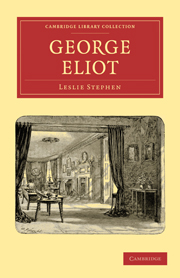Book contents
- Frontmatter
- Contents
- CHAPTER I EARLY LIFE
- CHAPTER II COVENTRY
- CHAPTER III “THE WESTMINSTER REVIEW”
- CHAPTER IV “SCENES OF CLERICAL LIFE”
- CHAPTER V “ADAM BEDE”
- CHAPTER VI “THE MILL ON THE FLOSS”
- CHAPTER VII “SILAS MARNER”
- CHAPTER VIII MIDDLE LIFE
- CHAPTER IX “ROMOLA”
- CHAPTER X “FELIX HOLT”
- CHAPTER XI “THE SPANISH GYPSY”
- CHAPTER XII “MIDDLEMARCH”
- CHAPTER XIII “DANIEL DERONDA”
- CHAPTER XIV CONCLUSION
- INDEX
CHAPTER VII - “SILAS MARNER”
Published online by Cambridge University Press: 05 July 2011
- Frontmatter
- Contents
- CHAPTER I EARLY LIFE
- CHAPTER II COVENTRY
- CHAPTER III “THE WESTMINSTER REVIEW”
- CHAPTER IV “SCENES OF CLERICAL LIFE”
- CHAPTER V “ADAM BEDE”
- CHAPTER VI “THE MILL ON THE FLOSS”
- CHAPTER VII “SILAS MARNER”
- CHAPTER VIII MIDDLE LIFE
- CHAPTER IX “ROMOLA”
- CHAPTER X “FELIX HOLT”
- CHAPTER XI “THE SPANISH GYPSY”
- CHAPTER XII “MIDDLEMARCH”
- CHAPTER XIII “DANIEL DERONDA”
- CHAPTER XIV CONCLUSION
- INDEX
Summary
George Eliot had not yet exhausted the materials of her early recollections. In the autumn of 1860 she wrote a short story called Brother Jacob, of which, as of its predecessor, The Lifted Veil, nothing need be said. But in the November of that year she began Silas Marner, which was finished in February 1861, and appeared by itself in March. Blackwood, she says, does not surprise her by calling it “rather sombre.” She would not have expected it to interest any one except herself (“since Wordsworth is dead”) had not Lewes been “strongly arrested” by it. The reference to Wordsworth is explained by her statement that it is meant to “set in a strong light the remedial influences of pure natural human relations.” She felt as if it would have been more suitable to metre than to prose, except that there would have been less room for the humorous passages. It was suggested, it seems, by a childish recollection of a “linen-weaver with a bag on his back.” The recollection, it must be admitted, can have counted for very little in the development of a story which is often considered to be her most perfect artistic performance. A curious literary coincidence—it can have been nothing more—is mentioned by Mathilde Blind. The Polish novelist, Kraszewski, wrote a novel called Jermola, the Potter, said to be his masterpiece, and to have been translated into French, Dutch, and German. Jermola is an old servant who has retired to a deserted house in a remote village.
- Type
- Chapter
- Information
- George Eliot , pp. 105 - 111Publisher: Cambridge University PressPrint publication year: 2010First published in: 1902

